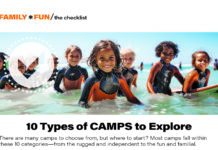Camps that take kids to faraway destinations for community service or study opportunities blend a sense of adventure with valuable learning experiences. Whether campers volunteer abroad or study marine life on Atlantic shores, the knowledge and independence they gain result in a new perspective on themselves and the world.
Map out a camp experience
Location is an educational tool at camps that focus on study in a particular habitat. At Whale Camp, based on Maine's Grand Marian Island in the Bay of Fundy, campers interested in marine biology climb aboard sailboats to observe whales and puffins, then collect data on their findings.
Assistant director Amy Lorenz says instructors help students comprehend the sea creatures’ world by comparing it to our own. “Animals in this tidal environment are surrounded by stressors and pressure,” she explains. “So after we do any sort of field study or exploration, we relate that back to our lives. It builds connections between the natural world and their experiences.”
The ability to see and touch what they're studying, as well as contribute to research being conducted by experts on the island, shows kids the importance of their discoveries. “Being out in the field and talking to other campers about what they're learning are things that can't be replaced by traditional academics,” Lorenz says.
For campers inspired by Parks and Recreation–style stewardship, teen volunteer trail crews organized by the New York-North Jersey chapter of the Appalachian Mountain Club spend one to four weeks creating and maintaining trails throughout the Northeast. Along the way, participants learn about recreation management, resource protection and conservation efforts, says volunteer programs manager Alex DeLucia.
Lasting impressions
Kids who sign up for community service–oriented travel tours explore new cultures while making a positive impact on the areas they visit. “The experience opens their eyes to the wider world and makes them want to help others,” says Norman Rein, founder of NJ-based Rein Teen Tours. Projects include volunteering at an orphanage in Costa Rica, working at an animal shelter in Hawaii and helping to maintain the village of a local indigenous tribe in Ecuador.
Many campers use lessons learned abroad to enrich their own communities. “They come back with a lot more compassion and confidence in the fact that they can make a difference,” Rein says. Alums often continue raising money for the projects they worked on or get involved in charity work closer to home.
Overcoming the challenges that come with volunteer work also improves perseverance and other qualities that enhance kids' everyday lives. “When participants are doing a project, they deal with real situations and learn to ask for help, use problem-solving skills and share ideas with peers,” DeLucia says.
Increased independence
Studying or volunteering away from home, where parents aren't around to safeguard electronics or whip out a credit card, encourages campers to take responsibility for themselves, their belongings and their budgets. “They learn a great sense of independence and how to make good choices,” says Cricket Snearing, director of Rockwood Adventures teen travel program in Blue Bell, PA, which hosts North American travel tours.
Making the choice to spend the summer focusing on passion projects that benefit others is also a sign of autonomy. “Kids take on a lot of responsibility when they know that people rely on the work they're doing,” Lorenz says, “and they really embrace that.”
Cheyenne Shaffer is a freelance writer and recent Temple U grad.






